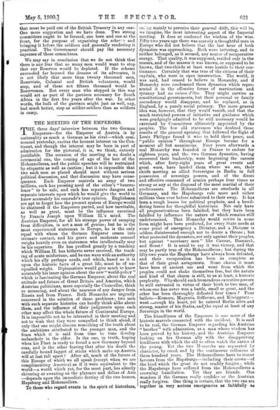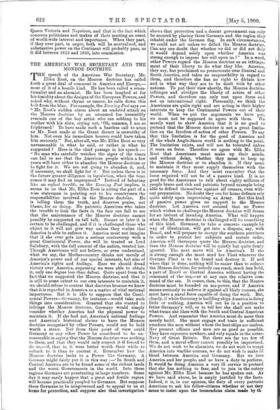THE MEETING OF THE EMPERORS. T HE three days' interview between
the two German Emperors—for the Emperor of Austria is by nationality as much a German as his rival—which com- menced yesterday, excites the keenest interest on the Con- tinent, and though the interest may be born in part of admiration for the pictorial, it is, we think, entirely justifiable. The occasion of the meeting is no doubt a ceremonial one, the coming of age of the heir of the Hohenzollerns, and the public speeches will be restrained by etiquette as well as caution ; but it is impossible that two such men so placed should meet without serious political discussion, and that discussion may have conse- quences. Each Emperor controls an army of two millions, each has pressing need of the other's " benevo- lence" to be safe, and. each has separate dangers and separate interests upon which he would give the world to know accurately his comrade's true opinion. Englishmen are apt to forget how the present system of Europe would be shattered if the Emperors parted, and how inevitable, as well as great, must be the influence exercised by Francis Joseph upon William II.'s mind. The Austrian Emperor, for all his strange power of escaping from difficulties, is not a man of genius; but he is the most experienced statesman in Europe, he is the only equal with whom the German Emperor comes into intimate contact, and his grave and moderate counsel weighs heavily even on statesmen who intellectually may be his superiors. He has profited greatly by a teaching which William II. has hitherto never received, the teach- ing of acute misfortune, and he can warn with an authority which his ally perhaps needs, and which, based as it is upon the historic facts of a great life, must be of un- equalled weight. Diplomatists would give much to know accurately his inner opinion about the new" world-policy" which is fascinating the German Emperor, about the real attitude and future of Great Britain and America, which Austrian politicians more especially the Chancellor, think so menacing, and about the nearness of any danger from Russia and from France. Both Monarchs are urgently concerned in the solution of those problems • two men with such separate histories can hardly think alike about them, and the influence of their judgments upon each other may affect the whole future of Continental Europe. It is impossible not to be interested in their meeting and not to wish that they were compelled to think aloud, if only that one might discern something of the truth about the ambitions attributed to the younger man, and the fears which it is said from time to time develop melancholy in the elder. Is the one, in truth, hoping when his Fleet is ready to found a new Germany beyond seas, and is the other fearing that after his death the carefully bound faggot of sticks which make up Austria will at last fall apart ? After all, much of the future of this Europe of which we all speak (except when we are complimenting America) as if it were equivalent to the world—a world which yet, for the most part, lies silently shivering or sweating on the plateaux and deltas of Asia —depends upon th6 immediate destiny of the two houses, Hapsburg and Hohenzollern. To those who regard events in the spirit of historians, cal ng mainly to perceive their general drift, this will be, we imagine, the most interesting aspect of the Imperial meeting. It does so confound the wisdom of the wise. Fifty-two years ago there was scarcely a thoughtful man in Europe who did not believe that the last hour of both dynasties was approaching. Both were tottering, and to neither belonged, as it seemed, any source of recuperative energy. That quality, it was supposed, resided only in the masses, and of the masses it was known, or supposed to be known, that two-thirds at least were hostile to their con- tinuance. Certainly that was true of the citizens of their capitals who were in open insurrection. The world, it was said, had ceased to believe in Monarchy, and if Monarchy were condemned these dynasties which repre- sented it in the offensive forms of martinetism and tyranny had no raison d'être. They might survive as constitutional governments, hut their personal or family ascendency would disappear, and be replaced, as in England, by a purely social primacy. The more general idea was, however, that they would vanish, and that the much restricted powers of initiative and guidance which were grudgingly admitted to be still necessary would be exercised by Committees ultimately appointed by the peoples. The few old statesmen who doubted these results of the general uprising that followed the flight of Louis Philippe found it, wise to hold their peace, and "public opinion" throughout Europe became for a moment all but unanimous. Four years afterwards a real Monarchy was founded in France to endure for eighteen years, and the two German dynasties, having recovered their leadership, were beginning the careers which, after forty-eight years of great events and great wars, have landed them where we see, their chiefs meeting as allied Sovereigns in Berlin in full possession of sovereign powers, and of the direct and effective command of armies perhaps four times as strong as any at the disposal of the most martial of their predecessors. The Hohenzollerns are overlords in all Germany, and the Hapsburgs rule more and richer millions than ever before submitted to their sway. It has been a rough lesson for political prophets, and a, bewil- dering lesson for thoughtful historians. Not only have all prognostications been falsified, but they have been falsified by influences the nature of which remains still undetermined. That Monarchy would revive in some form might have been predicted, for every State needs at some point of emergency a Dictator, and a Dictator is seldom disinterested enough not to desire a throne ; but what protected the dynasties, not only against their peoples, but against "necessary men" like Cavour, Bismarck, and Beust ? It is usual to say it was victory, and that may be partly true of the Hohenzollerns; but during the fifty-two years the Hapsburgs have always been defeated, and their recuperation has been as complete as that of their great antagonists. Some charm it must have been of ancient use and wont from which the peoples could not shake themselves free, but the nature and kind of that charm is still, to us at least, a historic perplexity. Why should such tremendous executive powers be still entrusted in virtue of their birth to two men, of whom one has never won a battle, small or great, and the other has been thoroughly defeated four times ? Four bullets—Komorn, Magenta, Solferino, and lainiggratz — went ...rough his heart, yet he entered Berlin alive and strong, master of his States, and:the equal at least of any Sovereign in the world.
The friendliness of the Emperors is one more of the historic marvels connected with the incident. It is said to be real, the German Emperor regarding his Austrian " brother " with admiration, as a man whose wisdom has been proved by his history, and the Austrian Emperor looking on his German ally with the disapproving kindliness with which the old so often watch the antics of the young. Yet the two Monarchs are separated by character, by creed, and by the continuous collisions of three hundred years. The Hohenzollerns have to resent favours from the Hapsburgs—including their crown—of the kind which the great do not readily forgive ; while the Hapsburgs have suffered from the Hohenzollerns a, crowning humiliation. Yet they are friends. One wonders if the German really confides or the Austrian really forgives. One thing is certain, that the two can act together in very serious emergencies as faithfully as Queen Victoria and Napoleon, and that is the fact which concerns politicians and makes of their meeting an event of world-wide interest and importance. When they part, if they ever part, in anger, both will be neutralised, and substantive power on the Continent will probably pass, as it did between 1815 and 1860, into commission.







































 Previous page
Previous page